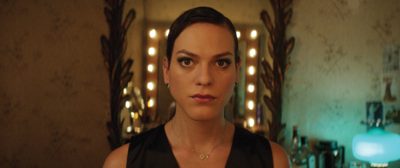
Chilean director Sebastian Lelio’s newest feature, A Fantastic Woman, has received recognition and buzz, earning nominations from the Academy Awards, Golden Globes and the LGBT critics association GALECA’s Dorian Awards. Even so, the film fails to understand or grapple with its transfeminine subject matter beyond a superficial level.
A Fantastic Woman follows transgender woman Marina (played by Chilean trans actress Daniela Vega) as she struggles to deal with societal hatred after the death of her cisgender male partner Orlando (Francisco Reyes). A Fantastic Woman is fundamentally a movie structured to garner sympathy for a minority person who is chastised at the hands of damn near everyone she encounters. If it were an American production with household-name actors, we’d rightly call it Oscar bait — it would be greeted with “movie of the moment” claims, and would be forgotten in five years.
Lelio’s artistic influences include greater directors like Rainer Werner Fassbinder and Pedro Almodóvar, both of whom made films about transgender women to varying degrees of success. A depiction of intense harassment is expected with a film of this type — as is a fascination with mirrors, designed to perhaps unlock some sort of mystery within the transgender gaze. But these images mean next to nothing if the film itself has no interest in exploring anything other than the superficial aspects of living life as a trans person. A Fantastic Woman repeatedly fails in this regard, focusing on escalating melodrama wherein transphobia becomes more outrageous by the minute, nearly to the point of losing all meaning. If you constantly show your audience the monster, the monster isn’t scary anymore. It becomes common, and in the real world, the kind of transphobia present in A Fantastic Woman isn’t common.
How useful is a bombastic depiction of transphobia in making a social statement? It seems that Lelio should have let viewers know more about Marina, developed her character further so the audience could feel deeper empathy for this poor, tortured woman, who can’t even have a dog without facing hostility.
But the question I have as a trans woman is this: What exactly is A Fantastic Woman’s function as transgender cinema? Now that we see actual transgender bodies on screen — rather than the misguided versions of trans people that were long presented by cisgender filmmakers — where are the transgender voices that should be guiding the conversation?
A Fantastic Woman isn’t made with a fundamental understanding of trans women’s bodies or personalities. The film is about the external factors of prejudice that influence the day-to-day life of a transgender person. The vast amount of punishment inflicted upon Marina in this movie does not offer insight into who she is as a person, and the film barely scratches the surface of what it’s actually like to be inside of a body that is transgender. Woman’s only real moment of guile and guts comes when Marina has to reveal her body to police officers as she’s being investigated as a person of interest in the possible murder of Orlando. Even then, the camera pans away from Marina as she hesitates, moving to a medium close-up of the officers reacting to her body with muted disgust.
Vega, to her credit, imbues the role with humanity during her uncomfortable reactions to transphobia and the brief moments of pure, almost reckless joy we see in musical montages. Those moments prevent the film from being completely worthless, but Vega deserves better. She should be the voice of this picture, but Lelio never places us in her shoes. It is a cowardly decision to take a third-person approach to this project, an approach that effectively says this isn’t a movie for transgender women, but rather a movie designed to shame cisgender transphobes — the sort of person who would never bother to watch the film in the first place, or to realize their own actions are horrific. A Fantastic Woman is a lesson in how you shouldn’t mistreat transgender people, presented to moviegoers who already have that basic sense of human decency.
For the trans women? Well, we already know being transgender means no one listens to our narratives about life. But this is a reminder that if a cisgender person tells a story about us, it’s suddenly gospel.
Email arts@nashvillescene.com





